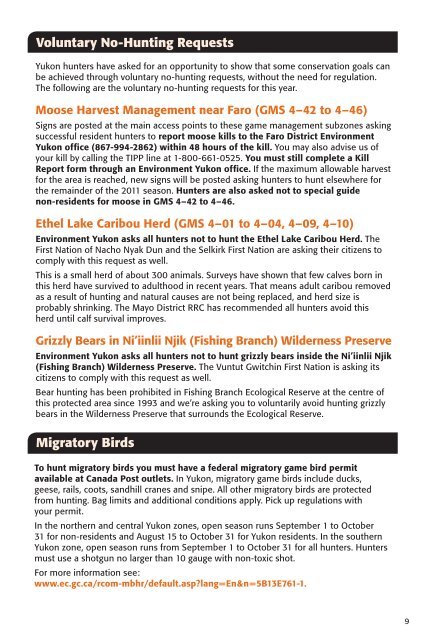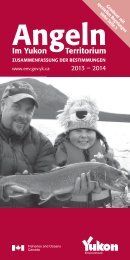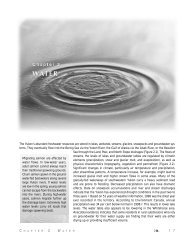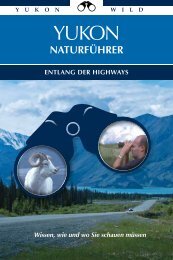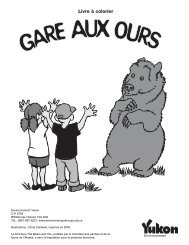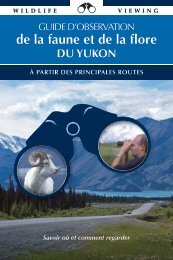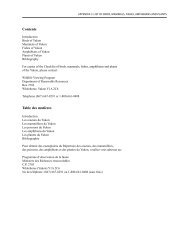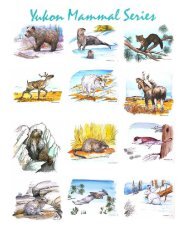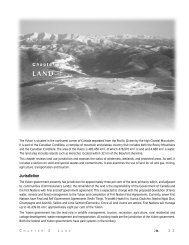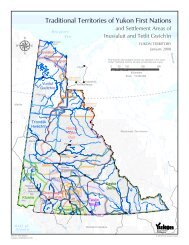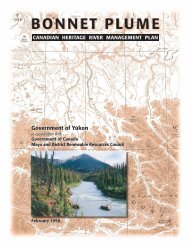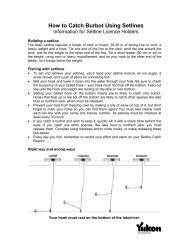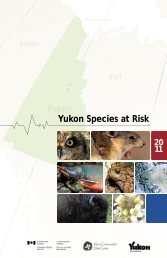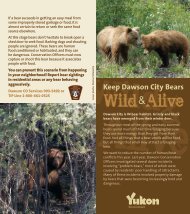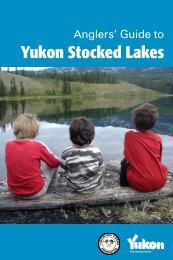Yukon Hunting - Department of Environment - Government of Yukon
Yukon Hunting - Department of Environment - Government of Yukon
Yukon Hunting - Department of Environment - Government of Yukon
Create successful ePaper yourself
Turn your PDF publications into a flip-book with our unique Google optimized e-Paper software.
Voluntary No-<strong>Hunting</strong> Requests<br />
<strong>Yukon</strong> hunters have asked for an opportunity to show that some conservation goals can<br />
be achieved through voluntary no-hunting requests, without the need for regulation.<br />
The following are the voluntary no-hunting requests for this year.<br />
Moose Harvest Management near Faro (GMS 4–42 to 4–46)<br />
Signs are posted at the main access points to these game management subzones asking<br />
successful resident hunters to report moose kills to the Faro District <strong>Environment</strong><br />
<strong>Yukon</strong> <strong>of</strong>fice (867-994-2862) within 48 hours <strong>of</strong> the kill. You may also advise us <strong>of</strong><br />
your kill by calling the TIPP line at 1-800-661-0525. You must still complete a Kill<br />
Report form through an <strong>Environment</strong> <strong>Yukon</strong> <strong>of</strong>fice. If the maximum allowable harvest<br />
for the area is reached, new signs will be posted asking hunters to hunt elsewhere for<br />
the remainder <strong>of</strong> the 2011 season. Hunters are also asked not to special guide<br />
non-residents for moose in GMS 4–42 to 4–46.<br />
Ethel Lake Caribou Herd (GMS 4–01 to 4–04, 4–09, 4–10)<br />
<strong>Environment</strong> <strong>Yukon</strong> asks all hunters not to hunt the Ethel Lake Caribou Herd. The<br />
First Nation <strong>of</strong> Nacho Nyak Dun and the Selkirk First Nation are asking their citizens to<br />
comply with this request as well.<br />
This is a small herd <strong>of</strong> about 300 animals. Surveys have shown that few calves born in<br />
this herd have survived to adulthood in recent years. That means adult caribou removed<br />
as a result <strong>of</strong> hunting and natural causes are not being replaced, and herd size is<br />
probably shrinking. The Mayo District RRC has recommended all hunters avoid this<br />
herd until calf survival improves.<br />
Grizzly Bears in Ni’iinlii Njik (Fishing Branch) Wilderness Preserve<br />
<strong>Environment</strong> <strong>Yukon</strong> asks all hunters not to hunt grizzly bears inside the Ni’iinlii Njik<br />
(Fishing Branch) Wilderness Preserve. The Vuntut Gwitchin First Nation is asking its<br />
citizens to comply with this request as well.<br />
Bear hunting has been prohibited in Fishing Branch Ecological Reserve at the centre <strong>of</strong><br />
this protected area since 1993 and we’re asking you to voluntarily avoid hunting grizzly<br />
bears in the Wilderness Preserve that surrounds the Ecological Reserve.<br />
Migratory Birds<br />
To hunt migratory birds you must have a federal migratory game bird permit<br />
available at Canada Post outlets. In <strong>Yukon</strong>, migratory game birds include ducks,<br />
geese, rails, coots, sandhill cranes and snipe. All other migratory birds are protected<br />
from hunting. Bag limits and additional conditions apply. Pick up regulations with<br />
your permit.<br />
In the northern and central <strong>Yukon</strong> zones, open season runs September 1 to October<br />
31 for non-residents and August 15 to October 31 for <strong>Yukon</strong> residents. In the southern<br />
<strong>Yukon</strong> zone, open season runs from September 1 to October 31 for all hunters. Hunters<br />
must use a shotgun no larger than 10 gauge with non-toxic shot.<br />
For more information see:<br />
www.ec.gc.ca/rcom-mbhr/default.asp?lang=En&n=5B13E761-1.<br />
9


